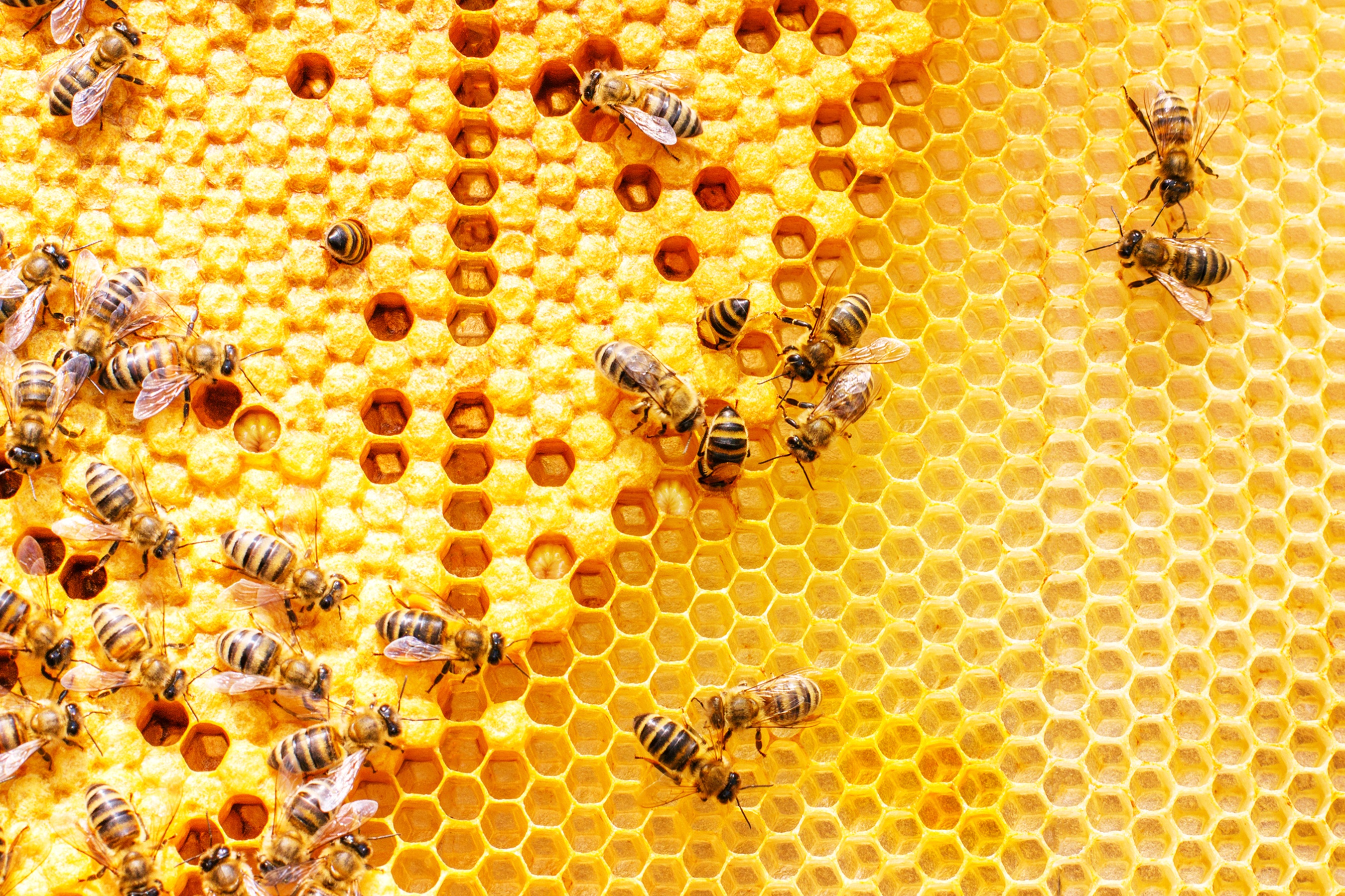Bee pollen is all the buzz lately. Many people are jumping on the bee pollen band wagon for its wide array of promising health benefits. Back in 2014, Victoria Beckham tweeted about bee pollen benefits as an anti-aging remedy, which sparked interest in the unique, tiny golden nugget superfood.
Bee pollen is fairly easy to get your hands on, and it’s affordable too. But what is bee pollen? Just like many fad diets, it might seem like bee pollen is the answer to the chronic pain you encounter from diseases like inflammation and cancer. However, it is important to do your research as supplements like bee pollen vary widely in quality and ingredients.
Bee pollen also has a unique taste that can take a little getting used to. Although more on the sweet side, it also has notes of floral and bitterness. Taking it alone can be too adventurous for most. If you are determined to take a daily dose, try mixing bee pollen in your morning smoothie, salad dressing, or even on top of your dark chocolate. In the beginning, you should consume a small amount of bee pollen and gradually increase your dose. Consuming too much bee pollen right away can cause digestive issues, and those with an unknown allergy could get a rude awaking if they overdose on the superfood.
To understand the bee pollen benefits, it is best to know where bee pollen comes from and the complexity of how it is collected. Bees have been using pollen to nourish their young honeybees and grow their hive. Researchers have been looking into how humans can benefit from the same nutrients including improving our health and preventing chronic diseases.
Related Article: Nutritional Yeast
What is Bee Pollen?
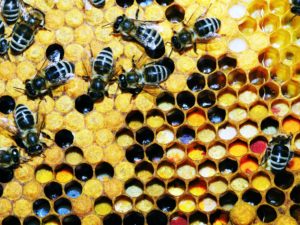

Pollen is required for the fertilization of plants and is produced from the male seed of flowers. All flowers produce pollen, as well as crops that are harvested, such as orchard fruits and agricultural crops.
Bee pollen contains amino acids in which fifty percent of these proteins can be directly used by the body. As such, bee pollen is considered to be a significant source of protein and nutrients.
Bee pollen is gathered by honey bees using their jaws and front legs. They use honey directly from the hive to moisten the dusting of pollen. The honeybee’s legs have bristles or pollen combs that brush the pollen from the legs while flying. This pollen is brushed into baskets outside of the tibias. When the pollen has filled the baskets, the pollen becomes a single granule of bee pollen. Pollen is stored in the hive’s honeycomb. It has a high moisture content and when the pollen is allowed to ferment from being stored it turns into “bee bread.” This “bee bread” is able to feed the entire bee colony including larvae and young bees. While honey and nectar give the bees energy, the pollen is their main source of nourishment.
An experienced beekeeper can collect bee pollen by making sure a thick comb covers the entrance of their hives. This thick comb collects pollen as the bees pass through it. The pollen falls off the bee’s legs into a bin below the entrance. (If collection bins are not installed, the pollen gets absorbed into the honeycomb.) The honeybees then sense that the pollen has been released and go out to retrieve more pollen. As bees continue to do this day after day, a significant amount of pollen can be collected by the beekeeper. Freezing collected pollen pellets is best way to preserve nutrients while harvesting. However, only experienced bee keepers collect pollen. If beekeepers keep the collection bins on for too long, the bees will not be able to provide enough pollen to keep their hive healthy, and young bees will begin to die. Removing collection bins too quickly will not gather enough pollen for the benefit of daily use.
The complexity of bee pollen is still a mystery to researchers. Bee pollen cannot be recreated in a laboratory. Many scientists have tried to feed honeybees manmade pollen and every time the bee dies, even though all of the nutrients found in bee pollen have been combined with precision. Many believe it is the hidden nutrients that are naturally derived from honeybees that make bee pollen benefits so appealing to those with illnesses and chronic diseases.
Eighty percent of plant life is pollinated by bees. As bees fly from one plant to another, a small portion of the pollen they are carrying is transferred to the next plant and so on. It takes a bee working eight hours a day for 30 days to create one teaspoon of bee pollen.
Nutrition
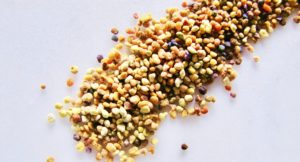

Since bee pollen is collected by bees near to their hive, the location where bee pollen is harvested can affect the contents of the bee pollen. Depending on the source of the bee pollen, the protein content will go up or down. Pollen contains all 22 amino acids humans need to survive and is especially high in proline and hydroxyproline, the building blocks for collagen.
Bee pollen composition also varies by season. Bee pollen collected in the spring will contain different amino acids than bee pollen that is collected during the summer months.
Related Article: What is A Holistic Nutritionist
Minerals
The minerals in bee pollen benefits include Magnesium, Calcium, Potassium, Sodium, Nickle, Boron, Chromium, Molybdenum, Iodine, Selenium, Manganese, Iron, Phosphorus, Zinc and Copper.
Carbohydrates
Bee pollen can have a fairly significant sugar and starch content. Bee pollen ranges anywhere from 15-50% sugar with a starch range of up to 18%.
Proteins
It has been shown in clinical studies that bee pollen taken orally can absorb into the blood stream within two hours of initial ingestion. With just two tablespoons of bee pollen, people who digest it well can get their daily protein just from the bee pollen alone. This is a great alternative for vegetarians and vegans who may struggle to get the amount of daily protein they need. Bee pollen is a great alternative to the nutrients you receive my eating meat and dairy. However, most vegans do not consider bee pollen to be a vegan food.
Vitamins and Lipids
The vitamins in bee pollen are water and fat soluble. Notable vitamins that have been found in bee pollen include B1, B2, B3, B5, B6, B7, B9, as well as vitamins C and E.
The varying shades of color in bee pollen is largely determined by different flavonoids and carotenoids. These pigments act as anti-oxidants and are shown to be anti-inflammatory and anti-cancer.
Is Bee Pollen Safe?
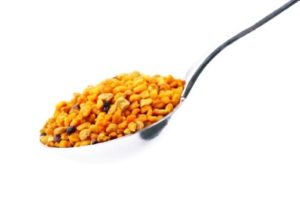

However, bee pollen can be contaminated with the residue from chemical pesticides. The bees collect this residue when gathering pollen from flowers and plants that have been treated with the pesticide. If you plan on consuming bee pollen on a regular basis and to improve your health, it is important to locally source bee pollen from an organic supplier to prevent any toxins from entering the body and overriding the health benefits you are trying to achieve. Also, look for bee pollen that does not contain any additives, and pollen that has not been heated or dried. Heating pollen can kill healthy enzymes and not be as effective in treating your ill health.
Bee pollen should also be avoided during pregnancy and while breast feeding. During pregnancy, it may stimulate uterine contractions. Bee pollen has not been tested to see if it passes through breast milk. As it is not recommended for children under 1 year old to consume honey due to botulism concerns, it is best to not consume bee pollen while breast feeding to avoid any side effects to you or your newborn.
Even though bee pollen is a natural product, side effects have still been noted. Common side effects include not being able to handle the taste of bee pollen, nausea, and diarrhea when new to ingesting bee pollen and stomach pains when not ingested properly. You may also experience an allergic reaction if you have any allergies to bees or bee products. This is especially evident when taking bee pollen orally. Allergic reactions can include shortness of breath, swelling, hives, itching or anaphylaxis (a severe, life-threatening reaction).
It is best if you take bee pollen in 30 to 60-day bursts. Although bee pollen is a natural supplement, taking it for longer than you need is not recommended.
Bee Pollen Benefits
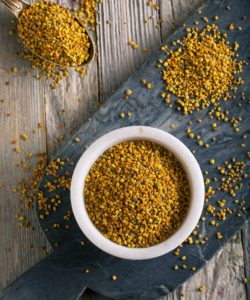

Fights Inflammation, Arthritis, Eczema
Bee pollen is rich in antioxidants that help protect against free radicals. These free radicals can result in chronic heart disease, cancer, diabetes, and autoimmune issues.
Bee pollen has been compared to man-made medications and has been shown to reduce inflammation and prevent the presence, growth, and spread of tumors.
Cholesterol
If you are constantly experiencing high cholesterol levels when you get your annual blood test, you might consider adding bee pollen to your diet.
Although we all need cholesterol in our bodies to function properly, too much cholesterol can lead to plaque in our arteries. This plaque can cause a heart attack or stroke to occur. By regularly adding bee pollen benefits to your diet, it can balance your cholesterol levels by reducing the bad (LDL) and increasing the good (HDL).
Balancing out the cholesterol can prevent heart disease as well as other chronic diseases.
Fights Cancer
Bee pollen has already been studied in reducing tumor size by killing the cells that allow tumors to grow. It is now being studied in cancer patients.
It is possible that bee pollen will be able to prevent the growth and spread of cancer in colon, prostate, breast, uterine, and leukemia.
While research is still be conducted, bee pollen is a valid future treatment for these types of cancers.
Healing Power Physically and Mentally
If you have recently noticed a burn or bruise on your body, you may benefit from consuming bee pollen. Since bee pollen fights inflammation and oxidation, it can speed up your recovery time for less money and side effects that prescription treatments. Since bee pollen is antibacterial, it will help prevent you from getting an infection from your burn or bruise too.
Immunity
Bee pollen is a holistic form of treatment for the prevention of the common cold as well as viral and bacterial infections.
It can be easily added to foods and smoothies to prevent dangerous infections such as staph, salmonella, and E. coli from attacking the body.
Combats Allergies and Asthma
Although some people are allergic to bees and bee pollen, it can also have a positive effect on seasonal allergies. People who suffer from hay fever or other pollen related allergies may benefit from ingesting a regular dose of bee pollen.
By getting your body use to bee pollen it can lessen your chances of having an adverse reaction during high pollen count weather days.
If you decide to use bee pollen to help treat your seasonal allergies, keep in mind you need to source local bee pollen for it to be effective. You will need to match the pollen in your area in order to gain immunity toward the symptoms of your seasonal allergies.
Bee pollen benefits can also decrease the function of mast cells. These cells release histamine. By decreasing their function, you can help reduce your allergy symptoms.
Liver Health and Body Detox
Your liver is constantly detoxing the body. It flushes out alcohol, prescription drugs, and toxins. It consistently breaks down hormones and creates cholesterol and vitamin D.
Bee pollen aids the liver is detoxing the body. The antioxidants in bee pollen not only improves liver health and body function, but can also reduce damage created by toxicity.
Acne
You already know that raw honey is an essential ingredient in fighting acne. Combining raw honey with bee pollen benefits can calm your skin and even reduce acne breakouts.
Increased Metabolism and Weight Loss
If you are constantly battling a slow metabolism, it can be hard to eat healthy and maintain your weight. Bee pollen, when consumed, can release nutrients in your body that help balance your body’s core cells. Bee pollen’s nutrients including vitamin C, flavonoids, calcium and phosphorous all work together to improve thyroid function. The thyroid is responsible for the metabolism and any imbalance can slow your metabolism and cause your body not to function as well as it should.
Bee pollen is an excellent source of energy. The variety of B vitamins it provides can provide an energy boost in the morning or during your mid-day slump.
Vision
While vision is a side benefit of taking bee pollen, it is one that is worth noting. Bee pollen can reduce inflammation, including making sure that arteries that crisscross behind the eyes are free from plaque and clogs. When these arteries are constricted, it causes vision problems, and bee pollen helps keep proper blood flow to the eyes, improving overall vision.
Fertility
Bee pollen is being studied for its fertility boosting properties in women. Bee pollen is being tested for stimulating ovulation, improving egg quality and increasing the odds of pregnancy by aiding in overall health. It is important to note that bee pollen benefits will not correct major fertility issues and should not be used as a fertility treatment substitute.
If you think bee pollen will help boost your fertility, talk to your doctor about dosage and testing to see if bee pollen would be beneficial for your fertility journey.
Menopause
Bee pollen can work wonders for women going through menopause. While some women do not notice a lot of symptoms when experiencing menopause, there are a lot of women who struggle with symptoms for a long period of time.
Bee pollen benefits can aid in improving energy levels, mood and sleep and help ease the pain of hot flashes and joint pain.
A study concluded that over 70% of women felt improvement in their menopausal symptoms after taking bee pollen.
Osteoporosis
Bee pollen has been used as a natural approach to treating osteoporosis. Bee pollen is being tested as is showing promising signs of improving levels of calcium and phosphate. Low levels of calcium and phosphate lead to bone loss. Regular doses of bee pollen may be able to protect against the bone loss created by osteoporosis.
Enhances Energy and Slows Aging Process
Bee pollen is considered a super food, a food that can actually allow you to live longer. The nutrients in bee pollen work with other foods to help the body work more efficiently. You will benefit from a regular dose of bee pollen by improving your cellular health, muscle function, and even rev up your metabolism.
Uses of Bee Pollen
It is fairly simple to add bee pollen to your daily diet. Bee pollen can be sprinkled over salads, yogurt, oatmeal, cereal, peanut butter or even dark chocolate. You can also incorporate bee pollen into recipes such as granola, breakfast bars and salad dressing.
How Do I Consume It?
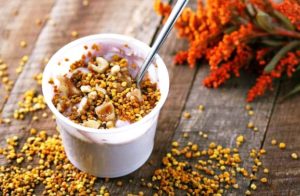

It is recommended that adults start with 1/4 teaspoon of bee pollen and gradually increase their dosage to 2 tablespoons on a daily basis. Bee pollen is safe for older children. Children should start with a smaller dosage; a few granules should suffice. Ad adult dosage should not exceed 3-5 tablespoons a day, while children should not exceed 1-2 tablespoons per day. If you choose to purchase bee pollen in capsules, make sure to read the label for proper equivalent dosage.
Bee pollen is difficult to consume on its own since its taste and flavor can be off-putting. To get around this, add a serving to a smoothie or juice. You can also use the powder form and add it to foods. Soak whole granules for a few hours in warm water, teas, or milk. The bee pollen is a super food that will continue to give you energy and health benefits throughout the day.
Where Do I Purchase Bee Pollen?
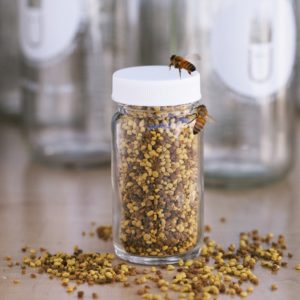

Bee pollen is very affordable. Pricing starts at around five dollars and increases in price by quantity and quality of the product. If you are looking for the highest quality, make sure the product does not contain additives and has not been heated. This will ensure that the bee pollen is at its purest form and will give you the most health benefits.
How Do I Store Bee Pollen?
When storing bee pollen, it is best to keep it in a place that is cool, dark, and dry. Typical storage solutions include the freezer, refrigerator, or pantry. Exposure to sunlight can decrease nutritional bee pollen benefits. If it is stored properly in an airtight container, pollen can last up to three years.
Conclusion
If you have tried medication and changing your diet and are not seeing the results you are looking for, bee pollen might be a great natural alternative. However, little research has been done on humans, most studies have only been done on animals and cells. Without proper testing, bee pollen should be taken with caution and discussed with your doctor before you being a daily regimen. Any allergy to bees or pre-existing conditions that require you to take blood thinners could cause adverse reactions when ingesting bee pollen.
If you are considering adding bee pollen to your diet and have weighed the potential risks, make sure you purchase your bee pollen from an established source, preferably bee pollen that is made closest to where you live as possible. Bees pick up pollen from a limited distance away from their hive. If you choose local bee pollen, you are able to mimic the environment that you live in. This is especially helpful if you are using bee pollen benefits to counteract seasonal allergies, whether internal or on your skin. Also, research if the bee pollen you are buying is organic. Purchasing bee pollen that could be tainted with local pesticides will only add to the toxins in your body. Non-organic or overly processed bee pollen will not provide the best bee pollen benefits you are looking for.
It is important to note that bee pollen is a natural supplement that can offer a lot of potential health benefits. While it is not a cure for any disease, it might help those with bad health or chronic diseases manage their symptoms.
If you miss a dose of bee pollen, do not use extra pollen to make up for the missed dose. Simply wait until your next dose to add more bee pollen to your system. If you overdose on bee pollen, you experience allergic symptoms, or your condition worsens, stop taking the bee pollen and contact your doctor immediately. Taking bee pollen for longer than thirty days at a time can cause serious symptoms to appear. You may experience a skin rash, bruising, muscle weakness, trouble breathing, stomach pain, or rapid weight gain.
